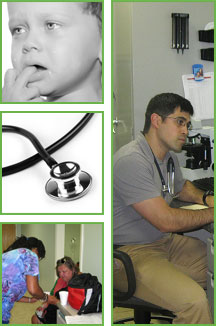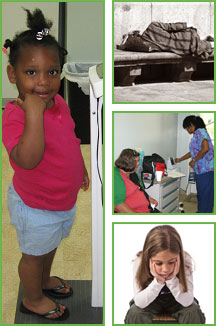Remarkable Facts
Enabling self-sufficiency (finding and keeping a job and affordable housing) will effectively address homelessness. However, health issues can become significant barriers and can cause or prolong homelessness.
Despite reported decreases in overall homelessness in Mecklenburg County, the number of homeless women without children and with children living in shelters increased dramatically. The clinic is located within the Salvation Army Center of Hope shelter, the regions largest shelter for women and children. The Center of Hope is over capacity, housing more than 425 residents a night. 200+ women and children seeking shelter have to be turned away monthly. All Center of Hope shelter residents can access the free clinic simply by showing the shelter ID.
Our clients are: 1) uninsured. 80% do not have Medicaid. The network of Medicaid services and providers are not available to them; 2) living in poverty. 85% report income of less than 100% FPL. Fee-for-service, “low” cost and sliding scale clinic are unaffordable; 3) medically indigent. Without the free clinic they would lack a medical home, primary care and continuity of care; 4) homeless. Living in the Center of Hope shelter.
Even for those with Medicaid, care beyond the clinc is not easy to access. They are experiencing fewer providers that take Mediciad, fewer Medicaid appointment slots, longer waits for appointments, rarely waived fees and co-pays and usually there is a need for transportation. With these obstacles to access, even those with Medicaid rely on the free clinic for some of their healthcare needs.
Children represent 34% of the clinic’s clients, half are between the ages of 0-5. Asthma and anemia are diagnosed in 25%. Children living in poverty develop asthma at a rate 6-times that of nonpoverty children. Anemia is also prevalent due to poor nutrition.
74% are African-Americans increasing the incidence of certain diseases. 45% of black women have high blood pressure. Diabetes is developed at twice the rate of white women. They are three times more likely to die of asthma, 25 times more likely to be infected with HV/AIDS and twice as likely to be overweight and have heart attacks. (Black Women at Higher Risk of Major Diseases. Molly M. Ginty. February 25, 2005. Women eNews)
African-American women have a similar rate of breast cancer as do Caucasian women, but have a higher death rate. Our collaboration with Novant Cancer Center brings their mammogram van to the clinic for free preventive mammograms and discussion groups on Breast Health and Cancer Prevention. Novant Cancer Center also provides free low-dose CT scans for early detection of lung cancer for clinic clients with a history of heavy smoking.
Clinic Achievements
- Annually more than 1,000 unique clients are provided care. 35% are children. Half of these children are ages 0 to 5 years
- Annually there are more than 5,000 total clinic visits. This represents more than 5 visits per client for follow-up and to address new health issues
- All services are provided free including nursing and provider care, diagnostic screens and labs, prescription and OTC medications, in-clinic treatments and health information. Our collaborative partners also provide their services free to our referral clients or if there is a charge, the clinic is billed for payment
- Level III Accreditation by N. C. Association of Free & Charitable Clinics, the highest level of accountability for free clinics
- Selected as the clinical site for Atrium Health Family Medicine’s Community Medicine Program. 3rd year Family Medicine residents provide care in the clinic in exchange for hands-on clinical experience in caring for a highly underserved population
- BBB Certified Charity Seal holder
- Member in good standing of National Association of Free and Charitable Clinics, North Carolina Association of Free and Charitable Clinics, MedLink, Homeless Services Network and Advisory Board of Mecklenburg County Coordinated Assessment






